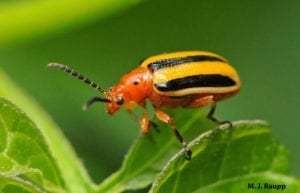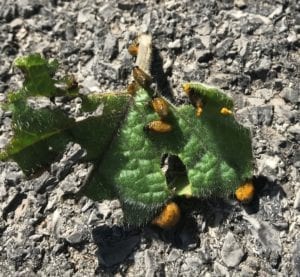Physalis Blog Post
Project Update: Physalis Pest Alert!
Hello Physalis Growers,
It has come to our attention that the insect known as three-lined potato beetle (Lema daturaphila) has been infesting Physalis plants this season (pictured below). They are known to prefer Physalis over potato.

According to the University of New Hampshire Extension the beetles lay eggs usually on the underside of the leaf and the larvae hatch in late June or July. Once hatched, these larvae resemble slugs. Below is a picture of Physalis plant material covered in the insect larvae. This plant material came from Danby, NY.

To control the infestation of these insects you can pick them off of the plants. If the plant is too overrun with the insects you may have to resort to a pesticide to rid the plant of the pest. If you choose this option please record the type of pesticide used.
As part of the project, we are interested in any information pertaining to pests, in particular if pests prefer one type of Physalis versus another. As you continue in to the growing season please keep your eyes peeled, and record any useful information on your survey sheet.
Happy Growing


